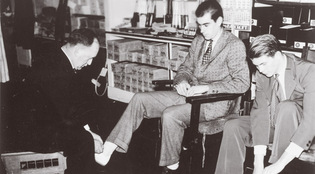 loading
loading
Life at Yale During the Great Depression Manuscripts & ArchivesYale College students try on white bucks in a local store in 1938. The shoes were a status symbol on campus. View full imageLife at Yale for wealthy undergraduates resembled escapist movies about the rich and carefree. They enjoyed their automobiles, weekends in New York, country club summers, sailing on Martha’s Vineyard, and trips to Europe. Spectator yachts lined the Thames when Yale rowed against Harvard at New London in June. When the residential colleges opened in September 1933, undergraduates selected by the college masters (there was not room for all) lived in luxurious suites, ordered meals from printed menus and were served by uniformed waitresses, and after eating perhaps repaired to the squash courts for exercise fitting their station in life. Faculty fellows of the colleges delighted in weekly dinners followed by port, conversation, and sometimes bridge or poker. The residential faculty fellows (bachelors only) had large apartments. The masters lived with their families in mansions worthy of bank presidents before the fall. Yearbook histories chronicled football victories, dances, the membership lists of fraternities and senior societies, with only a few passing comments on increased undergraduate interest in finding part-time employment or the difficulty the Yale Record was having with the cost of its new building. One cartoon showed a man with an empty basket; the caption asked, “Who’s got those six billions Irving Fisher told us Prohibition had saved?” Varsity football prospered. Games filled the Yale Bowl with cheering students and alumni. Gate receipts held up so well during the Depression that in 1931, the chair of President Herbert Hoover's committee for unemployment relief asked Yale to hold a postseason benefit game with other elite schools. In 1937, Yale raised the salary of one part-time assistant football coach, law student Gerald R. Ford ’41LLB, from $3,000 to $3,500, more than that of an entering junior faculty instructor with a PhD. Some alumni recalled afterwards that they were oblivious to conditions outside of Yale. Hear Senator William Proxmire ’38: “We lived in a kind of disembodied cocoon, a deliberate isolation from what we could see and smell and hear when we left the New Haven Campus. . . . Most of my classmates were wholly preoccupied with sports and girls and grades, and bull sessions about sports and girls and grades—in that order. If you wanted to be happy, it was a great time to be a Yalie. If you wanted to be serious—you had to wait.” Or novelist and lawyer Louis Auchincloss ’39, who confessed that “ultimately there was not, even for me, any keeping of the world (or FDR) out of Yale. Hitler barked on the newsreels. The King of England abdicated for love. Richard Whitney’s embezzlement shook my father’s world. On weekends at home my mother deplored my ivory tower. ‘The world is going to pieces,’ she complained at a lunch party, ‘and Louis is writing his term paper on the Medici popes.’ Bless Medici popes!” In contrast there are the memories of Bernard Wolfe ’35, a Jewish New Havener living at home and a political radical. He called the offer of a nonresident affiliation with Calhoun College “an insultingly social-work gesture,” adding, “I felt violated.” That they could have imagined for a minute that I’d go for their insipid English roast, served by a lot of underpaid black women in starched uniforms, most of them my neighbors, some of them my mother's friends, when nightly I enjoyed those fine pork-chop sandwiches smothered in hot sauce that they featured in the hash joints along Dixwell Avenue, and had the bonus of my real friends eating with me—that I took for the wildest sort of arrogance. . . . I couldn’t view Yale as something separate and apart from the Depression. . . . The thought crossed my mind in ways I wasn’t yet smart enough to figure out that Yale was a central component of the whole system that was diverting my mother’s earnings as a slavey into somebody else’s anonymous pockets. Wolfe's father, a machinist and talented violinist, had a nervous breakdown after losing his job when his factory shut down. “They took him away and locked him up in Yale's Institute of Human Relations,” Wolfe wrote, “where they had a psychiatric division devoted to the study of interesting cases. They judged my old man to be an interesting case. You don’t get many factory workers who are devoted to the violin.” Wolfe joined the Communist party and briefly worked for the exiled Leon Trotsky in Mexico. Impoverished students, a minority, struggled to stay in college, and some were forced to withdraw. The dean of freshmen reported that during 1932–33 ten students had to resign and 25 who had not been on financial aid were receiving support. Yale was reluctant to have students enroll in the work-study program of the National Youth Administration—a New Deal agency—because it “might endanger the University’s independence and educational freedom.” But eventually Yale accepted the program, which benefited some 250 students in 1935–36; student need was simply too great. Before it was instituted, the acting dean of Yale College, Clive Day ’92, had reported that many students were able to remain in school “only by generous scholarship aid, and by Spartan endurance.” He told of students living on food budgets of 25 cents a day and of one senior who asked to give up his college room “that he might sleep on the sofa of an office in which he earned his living.”
|
|